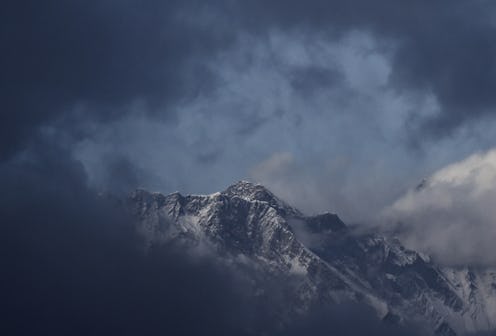News
A Tragic Weekend On The World's Tallest Mountain
At a towering 29,029 feet, Everest has long served as people's ultimate attempt to conquer nature and test the limits. Thousands of climbers have reached Everest's summit since it was first reached by New Zealander Edmund Hillary and Sherpa Tenzing Norgay in 1953. But the quest to summit is not without danger. Two climbers were reported dead on Mount Everest with another two missing after a perilous weekend left a sharp reminder of the risks that come along with climbing the world's highest mountain.
Two climbers died Friday from apparent altitude sickness after summiting Mount Everest. Eric Arnold, a 35-year-old from the Netherlands, reportedly died just hours after summiting after telling his expedition partners he'd begun to feel "weak," USA Today reported. It was his fifth attempt to reach Everest's summit. A second climber in Arnold's group, 34-year-old Maria Strydom of Australia, also died of apparent altitude sickness shortly after Arnold. Strydom had reportedly been descending from near the summit with her husband when altitude sickness set in.
Arnold and Strydom are believed to have died while above 26,000 feet in Everest's so-called death zone. Both were experienced climbers that had trekked to the dizzying peaks of other towering mountains.
In a separate expedition attempting to summit Mount Everest, two Indian climbers identified as Paresh Nath and Goutam Ghosh were reported missing late Saturday by an organizer from expedition agency Trekking Camp Nepal. Sherpas had initially lost track of four climbers in their group, the agency's director told CBS News, but had managed to rescue two found to be suffering from frostbite, illness, and snow blindness.
Arnold and Strydom were the first confirmed deaths of the year on the mountain, which is believed to have claimed the lives of at least 240 climbers. Although the dangers of scaling Mount Everest are well known and the mountain often pushes climbers to the limit this weekend seemed especially hazardous for climbers. Roughly 30 climbers fell ill with frostbite or altitude sickness on the Everest over the weekend, a mountaineering official told CBS News.
Along with the potential to fall ill with altitude sickness and frostbite climbers looking to trek up Mount Everest risk avalanches, rockslides, blizzards, freezing temperatures, dehydration, and physical and mental exhaustion. An avalanche in 2014 swiftly took the lives of 16 of Everest's Sherpa guides. Nepal's massive earthquake last year further cut tourism to the mountain. And while climbers are generally well-aware and well-trained to face the dangers that come with attempting to conquer the world's highest mountain, Mother Nature remains an unpredictable foe.
